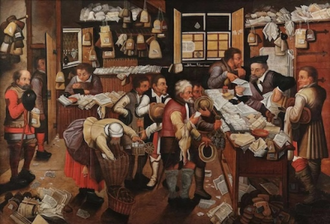Gospel in Art: Whoever keeps my commandments, he it is who loves me

The Peasant Lawyer by Pieter Breughel the Younger, 1620 Oil on panel © Grohmann Museum at Milwaukee School of Engineering, Milwaukee
Source: Christian Art
Gospel of 19 May 2025
John 14:21-26
At that time: Jesus said to his disciples, 'Whoever has my commandments and keeps them, he it is who loves me. And he who loves me will be loved by my Father, and I will love him and manifest myself to him.'
Judas (not Iscariot) said to him, 'Lord, how is it that you will manifest yourself to us, and not to the world?'
Jesus answered him, 'If anyone loves me, he will keep my word, and my Father will love him, and we will come to him and make our home with him. Whoever does not love me does not keep my words. And the word that you hear is not mine but the Father's who sent me. These things I have spoken to you while I am still with you. But the Helper, the Holy Spirit, whom the Father will send in my name, he will teach you all things and bring to your remembrance all that I have said to you.'
Reflection on the painting
Today's Gospel reading opens with a striking statement: "Whoever has my commandments and keeps them, he it is who loves me." Here, Jesus makes it clear that love and obedience are inseparable. They are not opposing forces, but two expressions of the same reality; two sides of the same coin. True love for God is shown not just in words or feelings, but in a willing commitment to live according to His will. Obedience, far from being a cold submission to rules, becomes a living response to love.
In today's world, we often view law and love as opposites. Law is seen as being rigid and impersonal; love as being free and emotional. Even when reading the Gospels, we can fall into the trap of casting the Pharisees as the strict legalists, while imagining Jesus as purely a figure of love, dismissing law altogether. But this is a misunderstanding. As theologian Peter Kreeft wisely put it, "Jesus was anti-legalism, but not anti-law." Christ didn't abolish the law; He fulfilled it, showing that the law, when lived through love, leads us to true freedom and holiness.
This brings us to the heart of Jesus' words - that love is not merely a feeling, but an act of the will. Love is a choice, a deliberate decision to seek the good of the other and to remain faithful to God's commands. That is why Jesus can command us to love: not because He demands an emotion, but because He calls us to choose love daily, even when it is difficult, even when it requires sacrifice.
Knowing how challenging this can be, Jesus promises us the help of the Holy Spirit, whom He calls the Advocate. To illustrate the idea of an advocate, we can look at Pieter Brueghel the Younger's painting of a village lawyer's office, where humble villagers queue with gifts in hand, seeking legal assistance. While this image reflects a limited, earthly understanding of an advocate-someone who speaks in our defence-the Holy Spirit is far more than that. The Spirit walks beside us as comforter, counsellor, guide, helper, and intercessor, empowering us to live out Christ's command to love. The Holy Spirit doesn't just defend us; He transforms us! The Holy Spirit makes it possible for us to love as Christ loves, with hearts that freely choose obedience, not out of fear, but out of deep and abiding love.
LINKS
Gospel in Art: https://christian.art/
Today's Reflection: https://christian.art/daily-gospel-reading/john-14-21-26-2025/ (with audio)


















